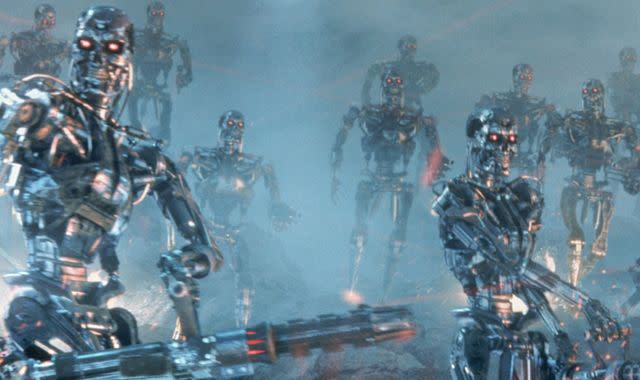Terminator and other sci-fi films blamed for public's concerns about AI

There are calls for more public education surrounding the future role of artificial intelligence, amid claims that many people's fears are based on films.
Rashik Parmar, chief executive of BCS, The Chartered Institute for IT, said Hollywood blockbusters like Terminator and Ex Machina had "ingrained" public concerns about AI.
His words came after a letter was released by the San Francisco-based Centre For AI Safety warning the technology could wipe out humanity and the risk should be treated with the same urgency as pandemics or nuclear war.
Mr Parmar said: "There should be a healthy scepticism about big tech and how it is using AI, which is why regulation is key to winning public trust.
"But many of our ingrained fears and worries also come from movies, media and books, like the AI characterisations in Ex Machina, The Terminator, and even going back to Isaac Asimov's ideas which inspired the film I, Robot."
While AI can perform life-saving tasks, such as algorithms analysing medical images like X-rays and ultrasounds, its fast-growing capabilities and increasingly widespread use via the likes of ChatGPT have raised concerns.
Last month, leading British computer scientist Geoffrey Hinton - considered the "godfather of AI" - left his role at Google with a warning it could fuel disinformation and leave huge numbers of people out of a job.
The regulation of AI has become a focus for governments around the world in recent months.
Prime Minister Rishi Sunak held talks earlier this month with the bosses of OpenAI, the company behind ChatGPT; Google DeepMind, and Anthropic.
The prime minister also met with Sundar Pichai, the chief executive of Google's parent company Alphabet, at the Darlington Economic Campus.
A Downing Street spokesperson said: "They spoke about striking the right balance to ensure the right regulatory guardrails are in place, whilst driving forward innovation."
Read more:
What is GPT-4 and how is it improved?
ChatGPT will make marking coursework 'virtually impossible'
Mr Parmar said regulation was needed to ensure AI "grows up responsibly".
"Do films and the media have to change? No. It just proves we need more public education about the reality of AI, and for it to be part of the skills and teaching we get when we're very young," he added.

 Yahoo News
Yahoo News 